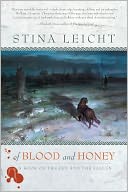Of Blood and Honey, by Stina Leicht

“Liam never knew who his father was. The town of Derry had always assumed that he was the bastard of a protestant—His mother never spoke of him, and Liam assumed he was dead. But when the war between the fallen and the fey began to head up, Liam and his family are pulled into a conflict that they didn’t know existed. A centuries old conflict between supernatural forces seems to mirror the political divisions in 1970s era Ireland, and Liam is thrown headlong into both conflicts. Only the direct intervention of Liam’s real father, and a secret Catholic order dedicated to fighting ‘The Fallen’ can save Liam … from the mundane and supernatural forces around him, and from the darkness that lurks within him.”
This book is at times brutal. I almost set it aside when, in the early chapters, Liam is dragged away to Long Kesh prison where he’s beaten and repeatedly raped. Those traumas awaken his púca heritage, releasing a monster intent on slaughter, a monster Liam struggles to control. While this is one of the few times I remember reading the “Rape as triggering event for magic/power and revenge” trope applied to a man, it was still unpleasant reading.
But I’m glad I kept going. Where the typical fantasy novel would use the Irish conflicts during the 70s as the backdrop for the mythical war between fallen and fae, Leicht made the opposite choice. The too-human hate and viciousness between Irish and British, Catholics and Protestants, take center stage, with the magical and fantastic elements woven in to emphasize the human conflicts, both personal and historical.
I especially appreciated the character of Father Murray, a Catholic priest who chooses not to execute Liam for his inhuman heritage, but instead to protect him, to try to save him. Like the rest of the book, he’s a complex character, at times incredibly noble and heroic, and at other times misguided on a tragic scale.
In an era like the Troubles, it’s impossible to remain pure. Father Murray embodies that conflict, and provides a model for Liam to start to come to terms with his own sins—not necessarily from a religious perspective, but from a human one. They’ve both made horrible mistakes and done unforgivable things, and Leicht doesn’t shy away from that or try to excuse it. Instead, she makes her characters—and the reader—face those choices and their consequences.
Perhaps because so much of the book was grounded in reality, the final battle between fae and fallen didn’t work quite as well for me. After so much of the vivid, gritty, historical violence of the period, the fantasy battle between fairy folk and fallen angels simply didn’t have the same impact.
Overall, it’s an ambitious debut. After those first few chapters, I was hard-pressed to set it down. Props to Leicht for taking on such a messy subject. My only reservations about recommending the book would be about the brutal rapes and violence. It didn’t feel gratuitous, but it was definitely disturbing.
You can read a bit more about the book in Leight’s own words in the interview I did with her here.
For those of you who’ve read this one, what did you think? I’d particularly love to hear from folks with a better knowledge of Irish history, as that’s an area where I’m afraid I’m a bit weak.
ETA: Two readers have pointed to Martin McGrath’s review, which takes issue with Leicht’s portrayal of the culture and conflicts in the book. I think McGrath makes a number of good and valid arguments that I missed.






Naraht
July 16, 2012 @ 9:54 am
Sad to say, the verdict from at least one knowledgable reader is fairly damning:
http://www.mmcgrath.co.uk/?p=2210
Jim C. Hines
July 16, 2012 @ 10:37 am
Thanks for that link.
Bleah. I hate feeling ignorant.
Another person pointed me to a piece at Strange Horizons that makes similar points, and is also worth reading.
Paul (@princejvstin)
July 16, 2012 @ 11:00 am
Well I am not a fan of the SH reviewer in question.
My review was far kinder than the two of those.
http://www.sfsignal.com/archives/2011/06/review_of_blood_and_honey_by_stina_leicht/
Those early chapters are hard and brutal, but worth working through.
Jim C. Hines
July 16, 2012 @ 11:13 am
My sense after reading and thinking about it a little more is that it works really well as a fantasy novel, but has some problems as a historical novel.
mamajoan
July 16, 2012 @ 11:24 am
Thanks for linking to those other reviews. They helped clarify for me why I found this book disappointing. Although I’m not very knowledgeable about Irish history, I was bothered by some of the main things those reviewers describe: the overly simplistic good-vs-evil/Catholic-vs-Protestant setup, the lack of description/”flavor” given to the various different cities where the action takes place, the inconsistencies of the language used by characters and narration. The writing itself is good and the story overall is reasonably interesting (although I do feel kind of astounded that here in the year 2012 writers, especially female writers, are still doing the “wife gets raped/murdered as character development for the husband” thing) but those things don’t quite make up for the lack of depth in the setting. I found it unsatisfying enough that I wasn’t at all tempted to seek out the sequel.